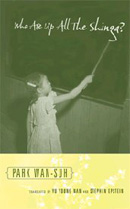

Columbia University Press, hardcover, 9780231148986
Both a coming of age story and a tale of ordinary people trying to survive in extraordinary times, Who Ate Up All the Shinga? is an absorbing read that will appeal both to those who enjoy intriguing storytelling and to those who are curious to find out more about the recent history of Korea from a personal rather than a purely political perspective.
Park Wan-Suh is a bestselling author in Korea, with her novels and short stories winning numerous awards. While Who Ate Up All the Shinga? is described on the cover as an autobiographical novel, it is more memoir than fiction. However, Park is keenly aware that childish memories are not always accurate and that imagination and memory are inevitably intimate partners, particularly if the writer is a natural storyteller from an early age.
Who Ate Up All the Shinga? begins with a lyrical account of Park's idyllic childhood in a small village near Seoul, although her book is essentially a story of survival in turbulent times. At the time of Park's birth in 1931, Korea is occupied by the Japanese. Many Koreans, including Park's widowed mother, believe that the best response to colonization is to embrace the "modern ways" brought by the Japanese. Park's resourceful and determined mother defies convention and family expectations by taking her two children to Seoul so that they can be educated in schools run by the Japanese.
Park's school years in Seoul are difficult and lonely. She is also brutally honest in the way she portrays her less than appealing adolescent self. And while she looks forward to visiting her father's family in the village where she was born, Park realizes that the city has more to offer in terms of career opportunities, particularly for her older brother. Just as it seems that Park and her family may have finally achieved the financial security and social standing their mother craves, their lives are turned upside down with the entry of Japan into World War Two.
The end of the war sees the Japanese march out of Korea, but the political vacuum left behind by their departure makes civil war inevitable. The last three chapters are harrowing in their description of families attempting to survive in a constantly changing war zone where it is difficult to work out who is the friend and who is the enemy.
While an ever increasing number of novels and memoirs by Japanese and Chinese
authors are now available in English translations, it still unusual to have the
opportunity to read something by a Korean writer in English. If this poignant
book is an indication of the quality and tone of contemporary Korean literature
we have much to look forward to as more Korean books are translated into other
languages.